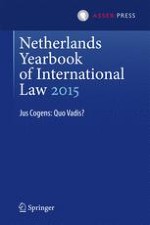2016 | OriginalPaper | Chapter
8. In Quest of the Practical Value of Jus Cogens Norms
Author : Elizabeth Santalla Vargas
Published in: Netherlands Yearbook of International Law 2015
Publisher: T.M.C. Asser Press
Activate our intelligent search to find suitable subject content or patents.
Select sections of text to find matching patents with Artificial Intelligence. powered by
Select sections of text to find additional relevant content using AI-assisted search. powered by
